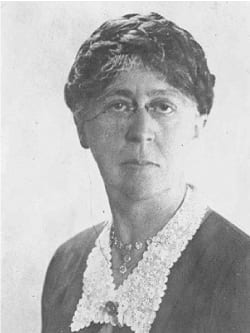The ‘Mother of Modern Management’
Mary Parker Follett: 'Mother of Modern Management,' a pioneer in leadership and conflict resolution, a woman ahead of her time. Read more about her profound insights.

Happy International Women’s Day! I’m going to share with you the name of an inspirational individual you’ve probably never heard of – and yet, there’s arguably no individual in history who personifies more so the combination of those two words: women and leadership. Indeed, any event or day that promotes leadership – irrespective of gender – should be honouring and celebrating the contribution this one individual has had on the world. In fact, the way we lead today, the way we work today, and the way organisations are structured today, can to a large extent be credited to this one woman who died almost 82 years ago. That person is Mary Parker Follett.

The most successful leader of all is the one who sees another picture not yet actualised.
Marry Parker Follett
If you’ve never heard of Mary Parker Follett, you’re forgiven. I, too, only heard of her for the first time recently. That her name is so foreign to most of us is perhaps understandable. After all, she never led a country, she never built a philanthropic institution, she never grew a billion-dollar business, and she never made it to the top of an international corporation.
What she did do, however, was pioneer the study of leadership in ways still embraced today. That’s why, in academic circles, she’s referred to as the ‘Mother of Modern Management’ – even though she died years before the FM radio had been invented.
- If you’ve ever mentioned the term ‘win win’, you can thank Mary Parker Follett for it. She created it.
- If you’ve ever professed the importance of having ‘power with’, rather than having ‘power over’, Mary Parker Follett was responsible.
- If at university you were introduced to the concept of transformational leadership, that’s all Mary Parker Follett’s thinking, even though you’d be hard-pressed finding her name in a vast majority of tertiary textbooks.
- If you’ve ever embarked on a conflict resolution strategy, it almost certainly stemmed from Mary Parker Follett’s work, which pioneered the ways in which conflict can be resolved constructively in the workplace.
- If you were taught the importance of being a collaborative leader rather than a dictatorial one, you can attribute that approach to Mary Parker Follett … who was considered “radical” for even proposing such a thing a century ago.
The fact employees are now seen as people rather than robots, as humans with feelings and motivators that should be understood and respected, can again be credited to the thought leadership of this one inspirational woman.
Sadly, when she passed away, so too did her ideas, until they were resurrected decades later by a more modern world yearning for a ‘fresh’ approach. Yet, when she was alive and recording her intellectual thoughts, her ideas on leadership were discarded, neglected, ignored. Why? Most probably because she was a woman. This is a shame considering both men and women these days embrace and live the values she espoused so many decades ago. Even though it’s sad she never received the recognition she deserved, it’s also inspiring to women to know the one who started all of this was actually – unsurprisingly – one of us.
So on this special day, as we celebrate the success of females to date, and as we explore the massive progress we still have ahead of us, let us remember the one who started this important movement. Not just of leadership, but of human-centred leadership. Our aim shouldn’t just be about getting more women into leadership positions. Our higher purpose should be, once we’re there, leading in accordance with what Mary Parker Follett stood for.
I’ll leave you now with two of her most profound quotations. The first is: “The most successful leader of all is the one who sees another picture not yet actualised.” The second: “If leadership does not mean coercion in any form, if it does not mean controlling, protecting or exploiting, what does it mean? It means, I think, freeing”.


Comments